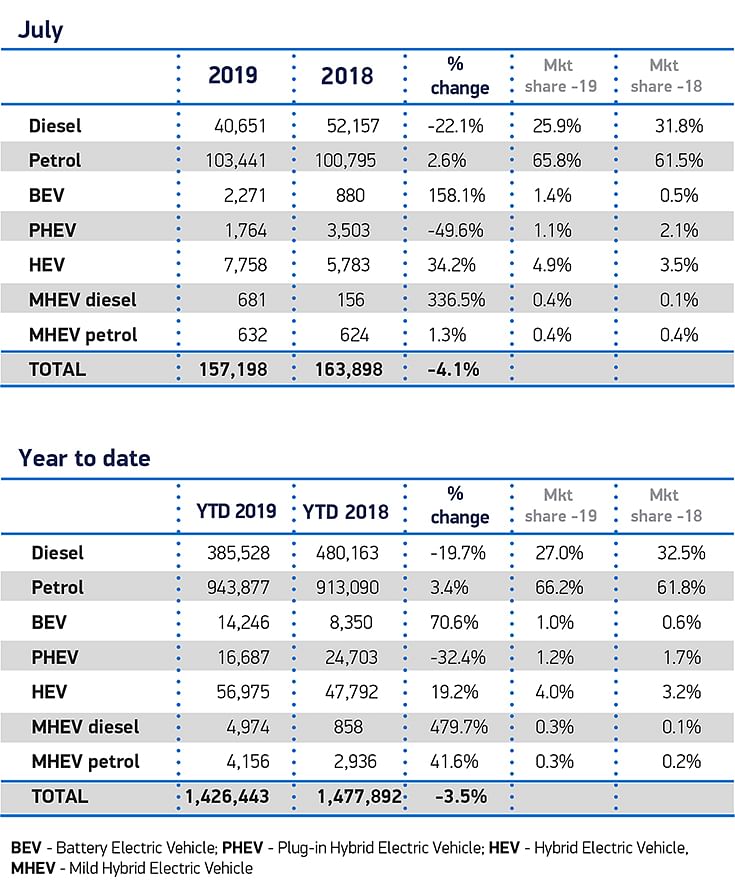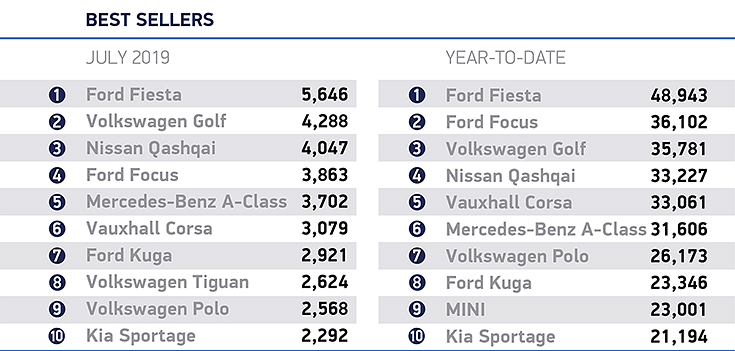EV sales scale new high in the UK, plug-in hybrids struggle
EVs accounted for a record 1.4% of the UK market in July, but the struggles of diesel and PHEVs meant overall sales fell.
A sharp rise in demand pushed electric cars to their highest-ever share of the UK car market in July, while sales of diesel and plug-in hybrid cars continued to fall.
A total of 157,198 cars were sold in the UK last month, according to figures from the Society of Motor Manufacturers and Traders (SMMT). That's a 4.1% decline on the same month last year and represents the fewest cars sold in July since 2012. The SMMT cited continued political and economic uncertainty, along with confusion over future government policy on fuel types, as key reasons behind the fifth consecutive monthly decline.
Diesel registrations fell 22.1% year-on-year, the 28th consecutive monthly decline for the fuel type, with 40,651 cars sold. By contrast, the 103,441 petrol cars sold represented a 2.6% year-on-year rise. Notably, while private sales dropped 2.0% year-on-year, sales to fleet and business customers were down 4.7% and 22.5% respectively.

Battery electric car registrations almost tripled to take record monthly market share in July. New EV forecast suggests full year share could double in 2020.
There were 2,271 battery electric vehicles sold last month, a 158.1% increase on the 880 sold in July 2018. That total represented 1.4% of all cars sold in the UK last month – a new record – and means the 14,246 EVs sold so far in 2019 represent 1% of the total UK market.
By contrast, recent changes in UK government tax policy reducing incentives for plug-in hybrid vehicle (PHEV) buyers continued to impact the market, with the 1,764 PHEVs sold last month down 49.6% year-on-year. By contrast, the 7758 hybrid vehicles sold in July represented a 34.2% year-on-year rise.
SMMT chief executive Mike Hawes called the growth of EV sales “encouraging”. He said: “Thanks to manufacturers’ investment in these new technologies over many years, these cars are coming to market in greater numbers than ever before. If the UK is to meet its environmental ambitions, however, [the] Government must create the right conditions to drive uptake, including long-term incentives and investment in infrastructure.”

The Ford Fiesta was again Britain's best-selling car in July, with 5,646 examples sold. The Volkswagen Golf (4,288) was second, ahead of the Nissan Qashqai (4,047), Ford Focus (3,863) and Mercedes-Benz A-Class (3,702).
In total, Ford has sold 48,943 Fiestas in the UK so far this year, putting it ahead of the Focus (36,102), Golf (35,781), Qashqai (33,227) and Vauxhall Corsa (33,061).
RELATED ARTICLES
Sept 2024 From R&D incentives to EV infrastructure: What auto components industry expects from Budget 2024
Sept 2024 From R&D incentives to EV infrastructure: What auto components industry expects from Budget 2024
US car majors hit the brakes on driverless cars
Ford Motor and Volkswagen to close self-driving startup Argo AI, due to lack of technology and clear regulations.
Autoliv and Geely to develop advanced safety tech for future vehicles
Scope of cooperation includes safety for high-level autonomous driving, intelligent steering wheel technology, a 360deg ...






 05 Aug 2019
05 Aug 2019
 4920 Views
4920 Views





 Autocar Pro News Desk
Autocar Pro News Desk




